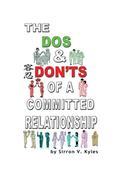Author's Preface "The reason for writing this book was to share personal information, experiences and solutions from those who are now working through committed relationships, along with research and conversations with others who also have been in committed relationships. When making the decision to enter into a commitment with another person, it should never be taken lightly or made hastily. It is too serious of an undertaking to be based solely on emotions. Most of us would not marry another person without giving it serious consideration; why would you think of making a similar type of commitment without giving it the same amount of common sense reflection?" To me, the most important way to start the conversation about the dos and don'ts of a committed relationship is to say that you don't have to believe everything you read in this book, but you might learn something if you do. Take this advice as just relationship information. Everyone's relationship is different and what matters to one person may not be important to another. Still, there are some general dos and don'ts outlined in chapters of this book that may prove very valuable when considering whether or not to enter a committed relationship. There's always an exception to the rule. For example, things you shouldn't tell your partner: "My mother thinks you're getting fat." Or "Actually, I think Scarlett Johansson/Chris Hemsworth/Tyra Banks/Chris Evans/ Diego Boneta/Kate Upton/Denzel Washington/Sofia Vergara is way, way hotter than you." You should use common sense concerning things that harm the relationship. Both parties should discuss past relationships. It may create doubt in their relationship during the beginning, until they get to know each other, but I feel it is best to start with a clean slate. Tolerance, honesty, communication, sex, faith, commitment, family, temptation, politics, finances and friends all influence how long and strong a committed relationship will be. I know from personal exper
-
- Categories
- Other
- Asian Food
- Thai Food
- Italian Food
- Pizza
- BBQ & Grill
- Indian Food
- Chinese Food
- Seafood
- Kebab
- Dessert
- Burgers
- Halal Food
- Drinks
- Salad
- Pasta
- Soup
- Lamb
- Beef
- Spanish Food
- Greek Food
- Pork
- Mexican Food
- Pastry
- Cocktails, Punch & Alcoholic Drinks
- French Food
- Portuguese Food
- British Food
- Moroccan Food
- Chicken
- Chef Recommendation
- Restaurant
- Cafe
- Where to Eat?
- For Home
- Fashion
- Decoration
- Food Products
- Business Services
- New
- Popular
- Gifts
- Videos
- Help / Contact Us
- Terms & Privacy
- What is FoodTerest


